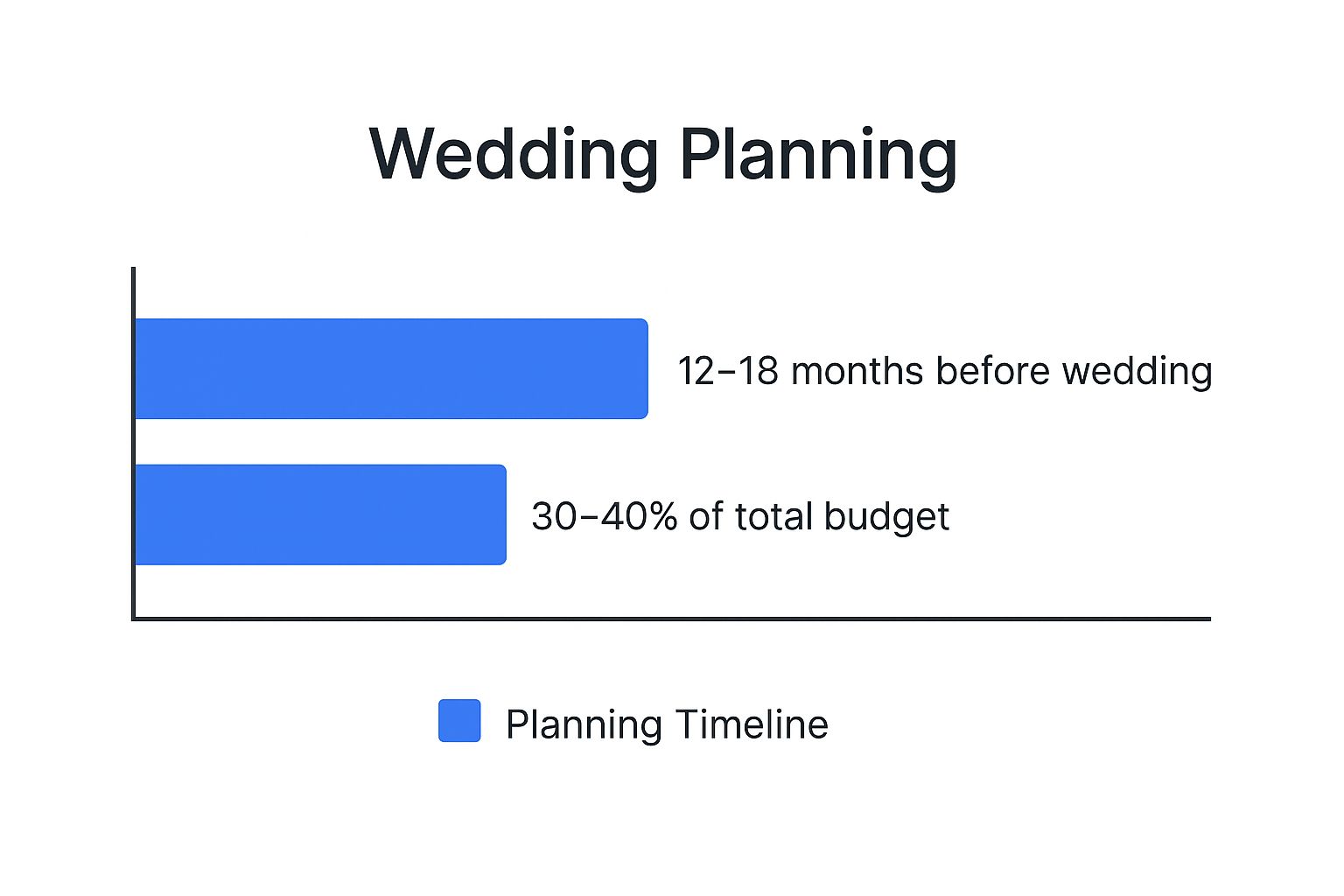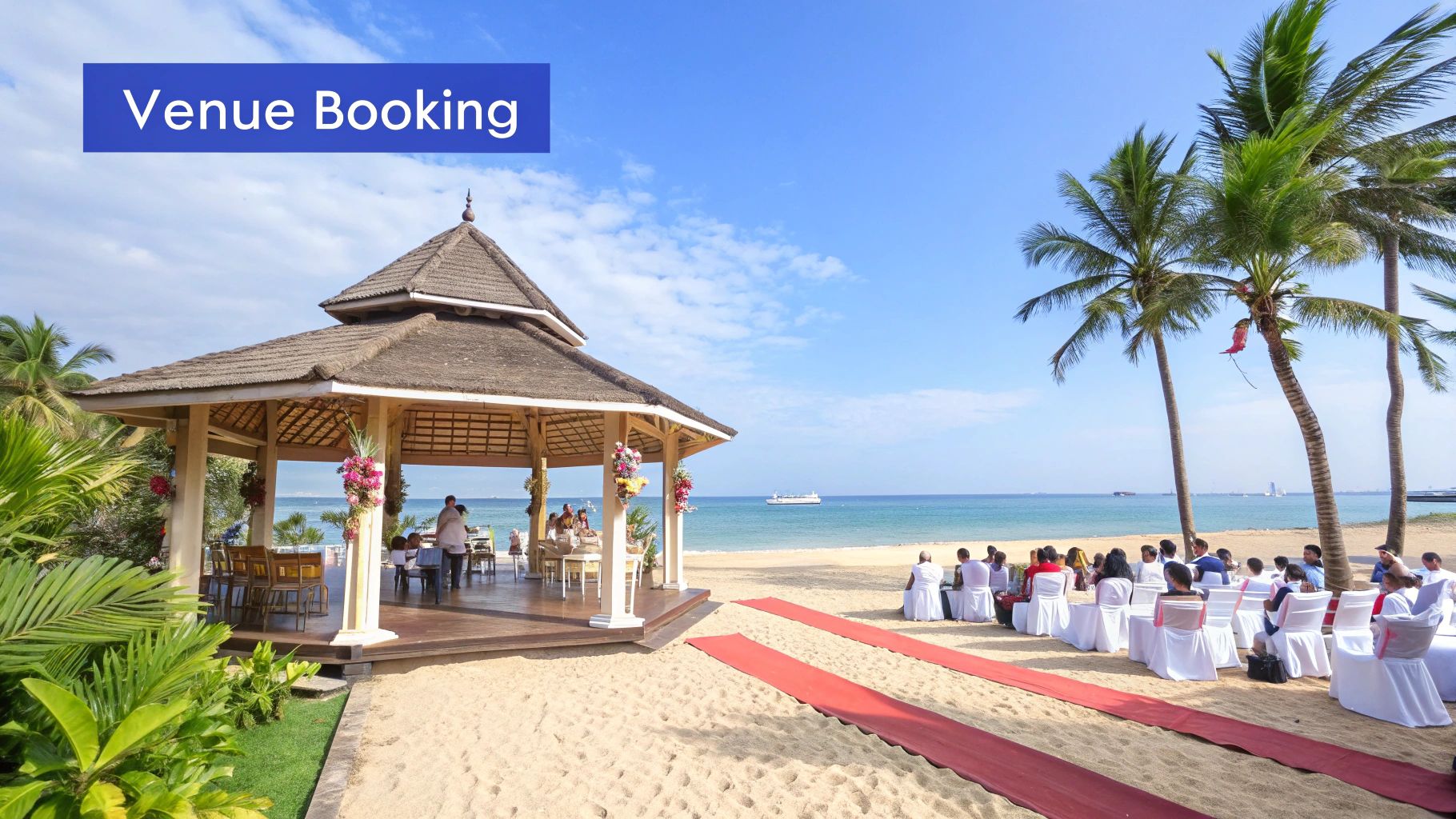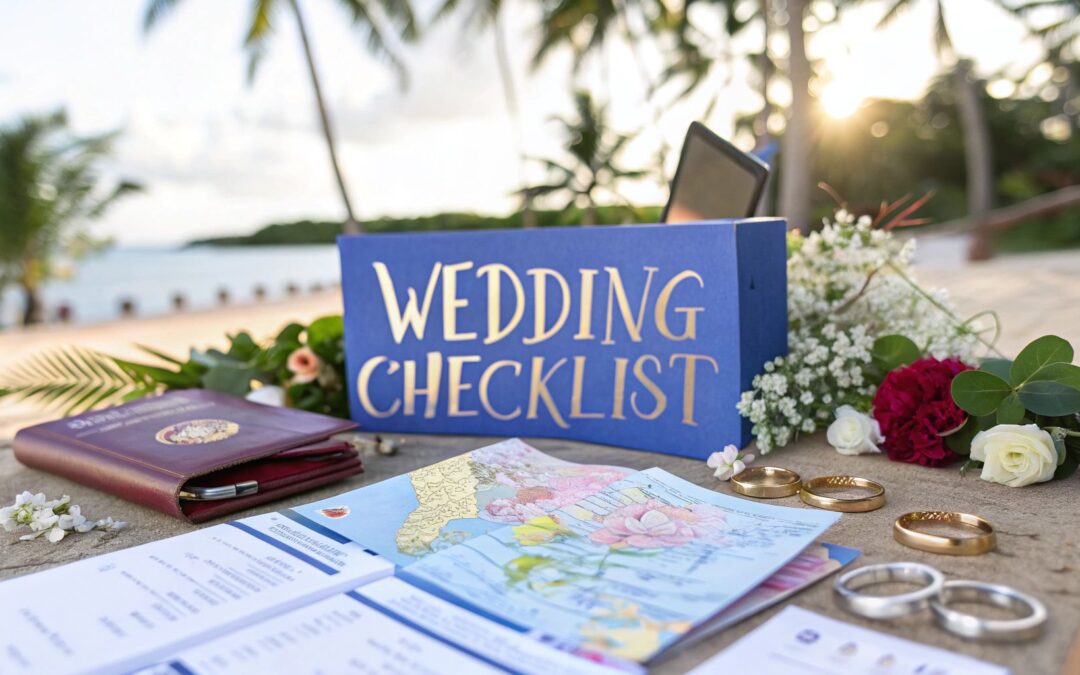Planning a wedding is complex. Planning one abroad adds layers of logistics, contracts, and vendor coordination that can overwhelm even the most organized couples. A destination wedding is not just an event; it’s a multi-day luxury experience for you and your guests, demanding a level of detailed coordination that goes far beyond a local celebration. This is especially true for our Miami-based clients accustomed to a certain standard of service, whether they’re flying to Lake Como or the Caribbean.
This destination wedding planning checklist is your strategic roadmap, built from my expertise orchestrating high-end celebrations worldwide. As a Circle of Excellence travel advisor, my approach moves beyond generic advice to provide the specific, actionable steps needed to execute a seamless, unforgettable wedding. Think of this not as a simple to-do list, but as a project management blueprint for one of the most significant investments you’ll make.
Together, we will navigate every critical phase, from establishing a realistic budget and researching international legalities to coordinating vendors across time zones and managing guest travel logistics. By following this expert-led checklist, you’ll avoid common pitfalls and focus on what truly matters: creating a flawless start to your marriage.
Key Takeaways for Planning Your Destination Wedding
- Start Early (12-18 Months): Secure the best venues and vendors by beginning your planning well in advance.
- Budget Beyond the Venue: Allocate funds for guest travel, currency fluctuations, and a 15-20% contingency.
- Simplify Legalities: Consider a symbolic ceremony abroad and a legal one at home to avoid complex paperwork.
- Prioritize Guest Experience: Create a wedding website and secure room blocks to make travel seamless for your guests.
- Hire an Expert: A luxury travel advisor transforms this checklist into a stress-free, concierge-level experience.
Ready to trade the checklist for an expert?
Plan My Destination Wedding
1. Choose and Research Your Destination
Choosing your destination is the cornerstone of any destination wedding planning checklist. This step aligns your vision, budget, and guest accessibility before you dive into vendor bookings. For discerning couples, this means looking beyond pretty pictures to analyze flight routes from hubs like Miami International (MIA), seasonality, and local infrastructure. A well-researched location ensures your event flows smoothly.
What This Step Involves
- Vision Alignment: Matching your aesthetic (e.g., Tuscan vineyard, Caribbean private island) with viable, high-end venues.
- Budget & Logistics Assessment: Understanding local costs, currency, and the ease of travel for your guests.
- Legal & Cultural Research: Confirming marriage license validity and understanding local customs or holidays that may impact your date.
Examples of Successful Implementation
- Tuscany, Italy: Perfect for romantic vineyard ceremonies. Requires an 18-month lead time for exclusive-use villas.
- Tulum, Mexico: Ideal for chic, beachfront weddings. Best planned outside hurricane season (June-November) to protect your investment.
- Santorini, Greece: Offers iconic cliff-top views. Target the shoulder season (April-June) for better rates and fewer crowds.
- Bali, Indonesia: Known for lush, private villa celebrations. Requires advance planning for guest visas from the United States.
When and Why to Use This Approach
- 12–18 Months Out: Begin research immediately to secure top-tier venues and vendors.
- High-Profile Guests: Early planning ensures access to private charters, premium airline seats, and exclusive accommodations.
- Legal Clarity: Confirming marriage license validity in your home country prevents future legal headaches.
Actionable Tips for Your Research
- Visit your top two destinations in person before making a final decision.
- Compile visa and passport requirements for all guests.
- Check for local holidays or festivals that could inflate prices or create logistical challenges.
- Verify marriage license requirements with the local embassy or a specialized planner.

This chart shows that dedicating 12-18 months to research allows you to secure the best rates and allocate your budget more effectively, preventing costly last-minute changes. Investing time upfront guarantees a seamless luxury celebration.
2. Establish Budget and Timeline
Establishing a comprehensive budget and timeline is where the dream meets reality in your destination wedding planning checklist. This phase moves beyond standard costs to account for travel, accommodations, currency fluctuations, and pre/post-wedding events. A well-defined financial framework prevents scope creep and ensures every decision aligns with your vision.

What This Step Involves
- Detailed Cost Analysis: Itemizing all expenses, from venue fees to international bank transfer costs.
- Timeline Mapping: Setting key milestones for vendor booking, payment due dates, and guest communications.
- Contingency Planning: Allocating 15-20% of your budget for unexpected costs like shipping delays or weather-related changes.
Examples of Successful Implementation
- Caribbean Destination Wedding:
- Budget: $35,000–$60,000 for 50 guests, including a welcome catamaran sail and farewell brunch.
- Timeline: 12-month plan to coordinate room blocks and island-hopping logistics.
- European Castle Wedding:
- Budget: $75,000–$150,000+ for 75 guests.
- Timeline: 18-month plan to accommodate high-demand venue booking windows and complex vendor contracts.
- Mexican Resort Wedding:
- Budget: $25,000–$45,000 for a 40-guest luxury all-inclusive buyout.
- Timeline: 9-to-12-month plan leveraging resort wedding packages and on-site coordinators.
When and Why to Use This Approach
- Immediately After Destination Selection: Create your budget and timeline right after choosing your location to guide all subsequent decisions.
- For Multi-Day Events: A detailed timeline is essential for managing vendor arrivals and guest activities seamlessly.
- To Manage International Payments: A clear budget helps manage currency conversions and transfer fees effectively, protecting you from market volatility.
Actionable Tips for Your Research
- Add a 20% buffer to your budget for unexpected costs and currency fluctuations.
- Create separate budgets for wedding expenses versus your personal travel costs (e.g., your honeymoon suite).
- Use a financial service that minimizes international transfer fees.
- Factor the cost of a planning visit into your budget, including flights and site inspections.
By meticulously establishing your budget and timeline, you create a solid foundation for a stress-free planning process. This financial roadmap empowers you to make confident decisions and deliver an unforgettable luxury experience.
3. Navigate Legal Requirements and Documentation
Navigating foreign legal requirements is a non-negotiable part of the destination wedding planning checklist. This step ensures your union is officially recognized back home, preventing complex legal issues. Each country has unique laws regarding marriage licenses, residency periods, and necessary paperwork, making this one of the most detail-oriented phases.
What This Step Involves
- Legal Research: Identifying the specific marriage laws of your chosen destination.
- Documentation Gathering: Collecting and translating official documents like birth certificates, passports, and any divorce decrees.
- Residency Compliance: Fulfilling mandatory waiting periods before the ceremony can legally occur.
Examples of Successful Implementation
- Barbados: No residency period is required; you can apply for a license immediately upon arrival.
- Las Vegas, USA: US citizens can obtain an immediate marriage license with a same-day ceremony, perfect for short timelines.
- Jamaica: Requires a 24-hour waiting period after arriving on the island before applying for the license.
- France: Has a strict 30-day residency requirement for at least one partner, making a symbolic ceremony a more practical option for most foreign couples.
When and Why to Use This Approach
- Early Planning: Begin legal research at least 12 months in advance.
- Symbolic vs. Legal: Many couples opt for a simple legal ceremony at their local city hall (e.g., in Coral Gables or Aventura) and a symbolic, stress-free ceremony at their destination to bypass complex foreign laws entirely.
- Complex Situations: If either partner has been previously married or is a citizen of another country, early legal counsel is non-negotiable.
Actionable Tips for Your Research
- Hire a local wedding planner or work with a travel advisor who specializes in the legalities for foreign couples.
- Get all required documents translated by a certified translator and apostilled if necessary.
- Ensure all travelers have valid passports; factor in the real cost of a U.S. passport and processing times.
- Verify marriage recognition requirements with your home country’s government. For European weddings, understand broader travel rules, as detailed in this guide on what is needed for European travel.
- Always travel with certified copies of all your important documents.
4. Book Venue and Accommodation
Securing your venue and accommodations is often the most significant financial commitment in your destination wedding planning checklist. This step locks in your date and serves as the foundation upon which all other decisions are built. It requires careful contract review, group rate negotiation, and a clear understanding of international booking practices.

What This Step Involves
- Contract Negotiation: Securing favorable terms for deposits, cancellations, and vendor exclusivity. This is where an expert advisor adds immense value.
- Accommodation Blocks: Reserving a set of rooms for guests at a discounted group rate.
- Logistical Confirmation: Ensuring the venue can accommodate your guest count and has a solid contingency plan for weather.
Examples of Successful Implementation
- Belmond Hotel Caruso, Amalfi Coast: Terraced garden ceremonies with stunning Mediterranean views. Requires booking over a year in advance.
- Excellence Playa Mujeres, Mexico: All-inclusive luxury simplifies planning. Their on-site coordinators manage logistics.
- Chateau de Varennes, France: A historic castle offering full estate buyouts for ultimate privacy. Ideal for multi-day events.
- Four Seasons Resort Bali: Lush beachfront venues paired with luxury villas, catering to high-end events with world-class service.
When and Why to Use This Approach
- 12-18 Months in Advance: Book immediately after choosing your destination to secure your first-choice venue.
- For Large Guest Lists: Room blocks are essential for simplifying guest travel and ensuring availability.
- In Unpredictable Climates: Prioritize venues with elegant indoor backup options for rain or extreme heat.
Actionable Tips for Your Research
- Negotiate group rates and special perks for guest accommodations, like complimentary breakfast or airport transfers.
- Visit top venues in person or schedule a comprehensive live virtual tour.
- Exploring unique wedding venues can provide inspiration.
- Thoroughly review all contracts, paying close attention to cancellation policies and outside vendor restrictions.
- Confirm the venue’s liability insurance and any requirements they have for your vendors.
Booking your venue and accommodations early creates a solid framework for the rest of your planning, allowing you to confidently move forward with securing other key vendors.
5. Coordinate Guest Travel and Communication
Coordinating guest travel is a critical component of the destination wedding planning checklist. It involves becoming a temporary travel concierge, providing clear logistics and managing expectations to create a seamless experience from their home to your “I do.” Proper communication prevents guest stress and maximizes attendance.
What This Step Involves
- Centralized Communication: Creating a wedding website as a hub for all travel details, schedules, and FAQs.
- Logistical Assistance: Securing room blocks, suggesting flights, and providing ground transportation information.
- Expectation Management: Clearly outlining costs, timelines, and the schedule of events so guests can plan accordingly.
Examples of Successful Implementation
- Costa Rica Jungle Retreat: A detailed website offered flight booking windows and shuttle options, leading to high attendance despite the remote location.
- Italian Villa Celebration: A travel advisor managed the multi-day itinerary, including a welcome party and farewell brunch. This concierge-level service simplified planning for guests traveling from Miami, New York, and beyond.
- Intimate Iceland Adventure: For a small wedding, the couple’s planner organized group activities like glacier hiking. Centralized planning made these unique experiences accessible and stress-free.
When and Why to Use This Approach
- 10–12 Months Out: Send save-the-dates for international locations to give guests ample time to book travel.
- For Complex Itineraries: When your wedding spans multiple days or venues, a centralized communication plan is non-negotiable.
- For High-Value Guests: For VIPs, a dedicated travel advisor can handle their arrangements, ensuring a flawless experience.
Actionable Tips for Your Coordination
- Create a wedding website with detailed travel, accommodation, and itinerary information.
- Provide a range of accommodation options at different price points.
- Consider hiring a travel agent who specializes in group bookings to simplify the process for everyone.
- Plan a welcome event to greet guests and maximize your time together.
- Provide guests with a thorough packing guide; get inspired by the ultimate travel packing list on exploreeffortlessly.com.
6. Select and Coordinate International Vendors
Selecting and coordinating international vendors ensures your vision is executed flawlessly by a team familiar with the local landscape. This involves sourcing, vetting, and managing providers who understand regional customs and can navigate logistical complexities, delivering a higher standard of service.
What This Step Involves
- Local Expertise Integration: Leveraging vendors who know the best local spots, seasonal availability, and cultural nuances.
- Communication and Contracts: Establishing clear communication protocols, payment schedules, and legally sound contracts across different time zones and currencies.
- Quality and Style Vetting: Ensuring a vendor’s portfolio aligns with your aesthetic and that they have proven experience with international clients.
Examples of Successful Implementation
- Bali, Indonesia: Hiring Balinese photographers for authentic cultural documentation, often at a fraction of the cost of flying in a US-based team.
- Tuscany, Italy: Partnering with Italian caterers experienced with international dietary needs and multi-course service standards.
- Riviera Maya, Mexico: Booking a local mariachi band for authentic entertainment and sourcing florals from a local designer to guarantee freshness.
- Paris, France: Using local French florists for garden-style arrangements with native flowers that comply with EU regulations.
When and Why to Use This Approach
- For an Authentic Experience: Use local vendors to infuse your wedding with genuine cultural elements.
- For Budget Optimization: This approach avoids the steep travel and accommodation fees required to bring vendors from home.
- For Logistical Simplicity: Local teams eliminate risks associated with travel delays, equipment transport, and customs issues.
Actionable Tips for Your Research
- Schedule video calls to review portfolios and establish a personal connection.
- Request and contact at least two recent international client references.
- Clarify all payment schedules and inquire about international transfer fees.
- Create a shared document outlining all deliverables, timelines, and creative expectations.
- Build a two-week buffer into your planning timeline for potential coordination delays.
7. Plan Transportation and Logistics
Coordinating transportation and logistics is the unseen framework that supports a flawless event. This step in the destination wedding planning checklist addresses everything from airport transfers for guests arriving from Miami to shipping your wedding dress, preventing delays and guaranteeing a smooth, stress-free experience.
What This Step Involves
- Guest Transit Coordination: Arranging airport shuttles, ceremony-to-reception transport, and daily transfers.
- Vendor & Equipment Transport: Ensuring your team can transport their gear safely, especially in remote locations.
- International Shipping: Managing customs and duties for shipping personal items like dresses, suits, or décor.
Examples of Successful Implementation
- Tuscany, Italy: Coordinated vintage bus transport for 60 guests between a remote vineyard ceremony and a private villa reception.
- Caribbean Island: Chartered private boats to transfer guests from the main island to a secluded beach for the ceremony.
- Aspen, Colorado: Organized a fleet of 4WD vehicles to safely transport guests and vendor equipment up a snowy mountain road.
- New Orleans, Louisiana: Rented private streetcar trolleys to combine a city tour with guest transportation to the French Quarter reception.
When and Why to Use This Approach
- For Remote or Multi-Venue Weddings: Essential when venues are spread out or difficult to access.
- For Large Guest Counts: Group transportation is more efficient and prevents guests from getting lost or arriving late.
- For Complex Itineraries: A multi-day celebration requires a detailed logistics plan to run smoothly.
Actionable Tips for Your Logistics
- Book all transportation at least six months in advance, especially during peak season.
- Provide guests with a detailed itinerary that includes exact pickup times and locations.
- Build buffer time into your schedule to account for potential traffic or customs clearance.
- Consider guest comfort (e.g., air-conditioned buses in tropical climates).
- Always have a backup transportation plan. For specific guidance on complex routes, our Europe transportation guide offers valuable insights.
8. Prepare Contingency and Emergency Plans
Preparing contingency plans is a non-negotiable step in any destination wedding planning checklist. This proactive measure safeguards your investment and guest experience against unforeseen events like severe weather, vendor issues, or travel disruptions. A well-defined backup strategy provides peace of mind and ensures your celebration can proceed smoothly.
What This Step Involves
- Risk Assessment: Identifying potential issues specific to your destination, such as hurricane seasons in the Caribbean or transportation strikes in Europe.
- Insurance and Contracts: Securing comprehensive wedding and travel insurance and ensuring vendor contracts include force majeure clauses.
- Backup Logistics: Arranging alternative venues, standby vendors, and a clear communication plan for guests.
Examples of Successful Implementation
- Caribbean Hurricane Season Wedding: Secured an elegant indoor ballroom as a backup for the beach ceremony and negotiated a 48-hour postponement clause.
- Aspen Mountain Wedding: Reserved a high-end tent with flooring and heating for unexpected cold or rain.
- Florence Wedding During Travel Strikes: Advised guests to book flights arriving three days early as a buffer.
- Phuket Wedding with Vendor Illness: Had a secondary photographer on standby through a local planner, who seamlessly stepped in when needed.
When and Why to Use This Approach
- For All Destination Weddings: This is a critical step for any wedding planned away from home.
- In Volatile Weather Regions: Essential for locations prone to hurricanes, snowstorms, or extreme heat.
- With Complex Travel Itineraries: Crucial when guests are arriving from multiple international locations.
Actionable Tips for Your Research
- Purchase comprehensive wedding insurance that covers cancellation, postponement, and vendor failure.
- Create a detailed emergency contact list with local authorities, hospitals, and vendors.
- Allocate 15–20% of your budget to a dedicated emergency fund.
- Develop a guest communication tree to disseminate urgent updates quickly.
- Build relationships with potential backup vendors before you finalize your primary choices.
What’s Included in My Concierge Planning Service?
- Venue & Vendor Curation: Access to my vetted global network of luxury partners.
- Contract Negotiation: Expert review of all terms to protect your investment.
- Guest Travel Management: Seamless booking and coordination for your entire party.
- End-to-End Logistics: From legal paperwork to day-of timelines, every detail is handled.
- VIP Perks & Access: Special amenities and experiences secured through my industry relationships.
Trade Your Checklist for a Concierge: Let an Expert Handle the Details
Navigating this destination wedding planning checklist is the first step. You’ve learned the importance of establishing a realistic budget, understanding complex legal requirements, and coordinating a global team of vendors. The journey requires meticulous attention to detail to transform a logistical puzzle into a beautifully orchestrated event.
The true luxury, however, isn’t in checking off boxes. It’s in the freedom to savor your engagement without being consumed by the complexities of event production. While this guide provides the “what,” the true advantage lies in having an expert handle the “how.”
My Philosophy: Your time is your most valuable asset during your engagement. Investing in an expert to manage your destination wedding allows you to reclaim that time and focus on the celebration.
A dedicated travel advisor does more than book flights. We take the items on your destination wedding planning checklist and turn them into a curated, high-touch experience.
- Vendor Vetting: We leverage our global network to connect you with trusted professionals, overcoming language barriers and cultural nuances.
- Legal Labyrinths, Simplified: We liaise with local authorities to ensure every piece of documentation is correctly prepared and submitted.
- Seamless Guest Coordination: We manage group room blocks, negotiate exclusive rates, and coordinate travel, ensuring every guest feels like a VIP.
- Proactive Problem-Solving: What happens if a flight from Miami is canceled? With an expert on your side, contingency plans are already in place.
Ultimately, my goal is to let you trade the checklist for a concierge. You bring the vision; I provide the expertise, industry connections, and logistical mastery to bring it to life. By entrusting the details to a professional, you are investing in peace of mind.
Plan My Destination Wedding or book a complimentary consultation call.
FAQs About Destination Wedding Planning
1. How much does a destination wedding cost?
A luxury destination wedding typically starts at $1,000-$1,500 per guest, but this varies widely by location. A weekend in Mexico might be $35,000 for 40 guests, while a multi-day affair in a European castle could exceed $150,000. We work with you to align your budget with your vision.
2. When should I send save-the-dates for a destination wedding?
Send save-the-dates 10-12 months in advance. This gives your guests ample time to request time off, save money, and make travel arrangements, especially for international destinations requiring passport renewals or visas.
3. Do we have to pay for our guests’ travel and accommodation?
No, guests are typically expected to cover their own flights and lodging. However, it is customary for the couple to secure a discounted room block and host several events throughout the wedding weekend, such as a welcome dinner and farewell brunch.
4. What’s the best way to handle legal marriage requirements abroad?
The simplest and most secure option is to handle the legal paperwork in your home city (e.g., at the Miami-Dade County courthouse) before you depart. You can then have a symbolic ceremony at your destination without worrying about complex foreign laws, translation services, and residency requirements.
5. How does working with a travel advisor for a destination wedding help?
A travel advisor acts as your project manager, saving you hundreds of hours in research and planning. We leverage our industry connections to secure better rates and VIP perks, vet international vendors, manage complex logistics, and handle any issues that arise, ensuring a seamless and stress-free experience for you and your guests.
6. Do you work with clients outside of Miami?
Yes, while I am based in Miami, I work with clients across the United States through virtual consultations. We can plan your perfect destination wedding no matter where you are located.
About the Author
Karrah Kazravan is a luxury travel advisor and the founder of Explore Effortlessly. With prestigious credentials including being in the Circle of Excellence (top 5% at Nexion) and a CLIA Accredited Cruise Counselor, Karrah specializes in crafting bespoke destination weddings, honeymoons, and complex multi-destination itineraries. Her concierge-style service and global network of partners ensure every client journey is seamless, personalized, and unforgettable. Based in Miami, she serves discerning clients nationwide.
Article created using Outrank
Love exploring effortlessly? Get weekly travel inspo, luxury deals, and behind-the-scenes stories straight to your inbox here.

